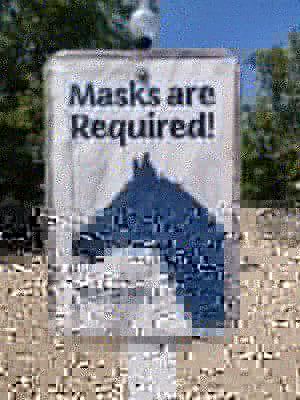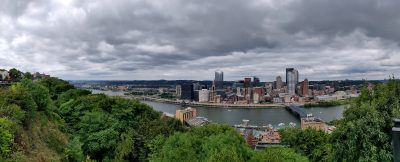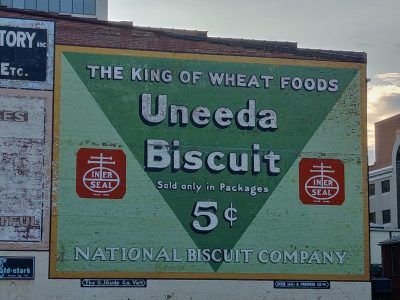by Bill Murray

“Please take that back, sir.”
The receptionist at Residence Inn by Marriott, Lexington, Kentucky, recoiled when I slipped my reservation confirmation onto the tabletop. Regrettably, they can not touch things at Residence Inn by Marriott. Surely we understand.
After sheltering in place since March, we’d driven off in search of … we didn’t know, really, towns down the road and then the towns after that. A pre-election driving tour of pandemic America, Georgia to Kentucky, Ohio, Pennsylvania, West Virginia, Tennessee and back. Ten days, five states, fifteen hundred miles.
Who could ask for more? All the allure of a Sunday afternoon waiting for Monday. Like that last day before the end of Daylight Savings Time. Fun as folding clothes.
Less than half of hotel workers have a job. Those who still do stay distant at work, skeptical by their new training, disengaged from the guests whose expense accounts would lead them out of all this. Rapport is a struggle from behind a mask.
It all feels surreptitious. With the card key come muffled breakfast details: Here is the menu web site (are we familiar with QR codes?), select one of four choices by touch tone. Delivery to the hallway. No one will change your sheets. We hope you enjoy your stay. On the other hand, crinkly eyes suggest a smile under that mask. The hotel has an eighth floor outdoor cafe, she says.
From up there, Lexington looks as vibrant as a town a quarter its size. People are still showing up for work, making the effort, it’s just that it’s already been six months. Started out, we’ll nip this thing. A couple of months of fretting and wringing hands. Now nobody believes it’s temporary at all. Everything now is halting, unsure.
Horse country dearly needs its University of Kentucky student vibe. Thirty thousand students should be around here somewhere. Over at the Rupp Arena they’re still billboarding an Arlo Guthrie and Judy Collins concert six weeks from now. Plans don’t mean a whole lot these days, do they?
•••••
William Jennings Bryan was a contender in four straight presidential elections and the Democratic nominee in three. Into the final turn, Joe Biden is hard on his heels. This is his third campaign and his first nomination.
Margaret MacMillan quotes the Duke of Wellington that Napoleon on the battlefield “was worth 40,000 men.” To borrow from Lloyd Bentsen, Joe Biden is no Napoleon. He doesn’t galvanize a crowd. He doesn’t command a room like you imagine Lukashenka does.
He is one year older than the median US male’s life expectancy. More than a third of Americans were born since Joe Biden has been in Congress. Joe Biden is fit, trim, as well-tailored as everyone with 36 years in Congress; he is not a large man. He has notable teeth. But can he do it?
The day before the Iowa primary back in February Biden made his closing argument in a Des Moines gym. He was expected to place fourth or fifth in the next day’s primary, and so he did. He booked a smallish venue, Hiatt Middle School, across the street from the Walgreens, Dairy Queen and Family Dollar on East 14th.
Biden rode with a tired entourage back in February. Just the old guys. We’d all stood around on the gym floor for ages by the time he showed up with former senators Dodd and Kerry, who sat on cordoned-off bleachers while Iowa’s Democratic congresswomen spoke, the former governor spoke, all the Biden relatives spoke, each one with passion and certitude and at length, as if we’d come to see them. Ever the effective firefighter, Harold Schaitberger, 73, president of the International Association of Firefighters, further cooled everyone’s enthusiasm.
Richard Ben Cramer wrote that “the joy of being with Joe” in his 1988 campaign (the plagarism campaign) was that “you were included.” Now, in Biden’s final campaign, we’re all included.
•••••
The light of day fades across the Ohio River. Embassy Suites by Hilton Waterfront Cincinnati in Covington, Kentucky is creepy, dark and getting old. Everyone who travels on business would recognize it, one of those places with an atrium, “sports bar” in the middle, a modest fountain, glass elevators.
Every amenity is closed. If anyone must enter our room we must vacate for three hours first. We may redeem up to two Admit One tickets per person, dispensed at check-in, for Coors Light beer. This is 2020’s “Manager’s Happy Hour Reception.” They will put breakfast in a bag on a table. We will let that go.
You have the watches, we have the time, the Taliban once jeered. Before the virus, Americans used to be in a hurry. Almost everybody’s lives have slowed down now, but the I-75 bridge across the Ohio River still teems with tractor trailers, every minute, all the time. Minnesota to Miami, relentless road commerce never, ever stops.
The water below the bridge used to carry that load. Now occasional coal barges pass below the highway bound for Louisville, a tight stricture at Evansville, the gracious curve at Paducah, down to where the Ohio River enlivens the Mississippi at Cairo, Illinois. Cincinnati’s restaurant riverboats, meanwhile, are parked and padlocked.

Poor Cincinnati. Pedestrian-friendly as a mine field, soulful as a rice market. I walk into Ohio across the John A. Roebling suspension bridge, the fancy new Bengals stadium on the left, the Reds ballpark on the right, connected by the 45 acre Smale Riverfront park, tiny between the stadiums, new enough that the trees offer no shade. The park is meant to connect the river to the city but a highway separates and isolates it on the riverbank.
The Macy’s building, the Kroger building, up and down and back toward the Great American Insurance Company tower and the Cincinnati Reds’ Great American baseball field alongside the forlorn and isolated Moerlein Sports Bar. Dozens and dozens of shuttered businesses. It’s heartbreaking. Lives and livelihoods chained and locked, “We are Closed” signs turned to the street.
Lots of towns (Paris, Milan, Tel Aviv, Minneapolis and Calgary) have used the crisis to become more pedestrian and bicycle friendly. Not Cincinnati. In a town built for insurance companies and automobiles you get endless one-way asphalt and just not any people.
•••••
I don’t think I have ever driven across Ohio until now, and it is revelatory. Like Lindsey Graham’s promises about Supreme Court nominees, call me on this if I’m wrong: Ohio is voting Trump.
Across the highway from Monroe, Ohio, where the Cincinnati Outlet Malls are, is Lux Mundi, a 52-foot statue of Jesus decorated by a water feature, its arms outstretched in welcoming embrace. It replaces an even taller statue, whose uplifted arms earned it the nickname Touchdown Jesus before it suffered an unfortunate allegorical fate. It was struck down by lightning and burned to the ground. “I never thought this would be vulnerable,” the fire chief said at the time.
Somewhere shy of West Virginia a leaf of copy paper taped to the door of a convenience store declared that “for documented medical reasons an employee of Quiznos is not wearing a mask. If you don’t want to, you don’t have to come into this store.” So we didn’t. At the truck stop across the street a public address system announced “customer 11, your shower is now ready. Please proceed to shower number two.”
The Quiznos warning had a tinge of defiance but at least it was a warning. Ordinary folks were defiant, too. There were few masks.
It strikes me more and more these days that a benign, bedrock Appalachian principle, protectiveness of the clan, lines up naturally with the anti-immigrant, build that wall crowd, and more generally, with that no-mask disregard for your neighbors. It pairs well with the Trump Save America billboards towering over the Ohio corn fields.
•••••

So, Pittsburgh. Good looking town, feels semi-confident, determined. The Fairmont Hotel, an expensive two-room suite, in case it feels best to stay inside. Minibar locked, virus precaution. So, ice? You can get a bucket of ice on 15. No sir. We can’t bring it to you. You must understand, no one is at work today.
The Fairmont has furloughed most staff but positions a man with a temperature-taking machine at the door. Not reassuring. It reminded me of metal detectors you walk through and those wands they wave over you at hotels in places like Belgrade and Istanbul.
The Fairmont boasts they keep each room 48 hours between occupants, the hotel equivalent of not booking the middle airline seat. That will hold up precisely until demand warrants further bookings. For now the safety of our guests is paramount. And we very much regret locking up your minibar. Ice is available on the 15th floor.
I find the environmentally grave Keurig machine but no coffee, no mugs, which have been removed for our safety. If you call and wait they eventually bring capsules and styrofoam cups. This hotel is shocked, wobbly, tentative.
Maybe corporations are people too. Might they try showing a little vulnerability? “Listen, we know as well as you do this is a precarious time. We’d really like you to have a good experience because right now especially, we appreciate your business, we need your business to survive.”
Could the virus will shake out a little gratuitous corporatespeak? Room service, a reduced menu available from five until nine only, “will be presented in disposable food containers, and be delivered to your room by a server wearing personal protective equipment. It is mandatory that you are wearing your mask when you receive the order. When finished please place everything in bag provided and place outside your room. Call Royal Service for retrieval.”
Royal indeed. Brings to mind the burn bag for the royal papers. I’m sure it’s all well meaning, the way they drop the styrofoam, knock on the door and sprint away down the hall.
•••••
Sunday September 13th. Roanoke, Virginia, capital of the Blue Ridge. Railroad town. Clings to the railroad tight as Obama’s “They get bitter, they cling to guns or religion or antipathy to people who aren’t like them or anti-immigrant sentiment or anti-trade sentiment as a way to explain their frustrations.”
They built Roanoke before they built the country, in the 1740s, when settlers from Pennsylvania took up land near salt licks where buffalo, elk and deer gathered and native Americans lurked to hunt them. Roanoke began as Big Lick.

The next time you’re over this way, try the Hotel Roanoke and Convention Center, a gracious, old-style city center hotel. They’re not much for masks here, but like much of the south it’s gracious, full of heritage and lovely.
The railroad built Roanoke and the rails run active all day. A tight, compact center, very small with unexpected amenities, an art museum, a black history museum, Thai and Indian restaurants, a few other restaurants, a few bars, a few boutique shops, and the great Appalachian affliction: suspicion of and an evil eye toward the stranger. What might an old guy like me do? Shout at someone?
There are very few for Biden around here. What you have is Trump backers, comforted by the divider in chief and his schemes to keep out the unknown.
•••••
It’s “like a memory question. It’s like, you’ll go: Person. Woman. Man. Camera. TV,” the president said. “So they say, ‘Could you repeat that?’ So I said, ‘Yeah. It’s: Person. Woman. Man. Camera. TV.'”
“Then, ten minutes, 15, 20 minutes later they say, ‘Remember that first question… Give us that again.”
“And you go: ‘Person. Woman. Man. Camera. TV.'”
“And they say ‘that’s amazing. How did you do that?'”
It’s hard to know how to address opportunities like this. Maybe the Biden campaign is on to something with its double reverse, bank shot, incumbent Rose Garden “I’m the president you wish you had” strategy. Way back in Des Moines in February, we all knew he was doomed. But maybe he was right.
We have to hope so, because watching our unsteady, recovering leader this week, it is pretty clear our institutions won’t survive his reelection intact. If we endorse the Trump presidency with another term we will deserve the withering international opprobrium that will surely come.
Perhaps Joe Biden pulls this off and moves a grateful nation toward the broad, sunlit uplands, but depending on him so much makes me uncomfortable. The virus has given him astonishing political advantages through no effort of his own. As in his two previous campaigns, that afternoon back there in Iowa he was this close to being sent home again.
Maybe we can take heart that the administration’s closing campaign strategy is as ad hoc as always: can we fake this and get by one more time? On the virus: “I think we’re nearing the peak right now,” said Robert Redfield to the Today Show – six months ago, on April 13th. Watch.
It strikes me that they’re all just out there talking, saying words, and you know it and they know you know it.
•••••
Knoxville. Almost home. The confluence of the Holston and French Broad rivers creates the Tennessee River, alongside which the football stadium holds pride of place. Down here we take our college football seriously. Neyland Stadium, home of University of Tennessee football, is the seventh largest stadium in the world. It can hold over a hundred thousand people, more than half of Knoxville, and its emptiness now is just murder for this town.
It tears at Knoxville’s gut. Without students, without autumn’s pageant of leaf watchers bound for Gatlinburg, and Dollywood and football, perhaps a third of what should be a thriving downtown Market Square hangs on ragged, listless, not defiant, just perfunctory.
There is a stretch of interstate highway not far back up the road that shares north and southbound state highways at the same time. You can be going in opposite directions at once, a metaphor for our times.
Even as the Obama years salved black America, the loss of factory jobs brewed up a cauldron of trouble in this quarter of the country, as hard-working conservative white people came under stress. Nevertheless, Zanesville, back up in Ohio, the kind of town portrayed as one of those “decaying communities in revolt against the modern world,” looked lovely.
We are meant to understand it has been hard hit by opioid addiction, but the local paper can’t hide its pride:
“You can live in a historical district, a downtown artist colony, or so far out in the country hills that you’ve got no mobile phone coverage. There’s farm-to-table food, fast-food joints, and Tom’s Ice Cream Bowl, voted USA Today’s “Best Ice Cream Shop in America” as every proud Zanesvillian is pleased to tell you. It’s Midwestern small-town America.”
Thing is, a pandemic doesn’t emerge from high-minded debates about globalization and the working man. It just emerges and gets to work. Lawrence Wright wrote that civilizations flourish in the arrogance of progress. Here, perhaps, is comeuppance.
In the House of Commons, February 1871, William Gladstone dialed straight into our American future: “I think it would be rash on our part to indulge in too sanguine anticipations.”
Three weeks until election day the president is flailing. Best to remain cautious and hope cooler heads prevail. Except, find me a cooler head. If hope is patience with the lamp lit, lanterns across the land burn low, late in this election year like no other, the year that just won’t let up.
